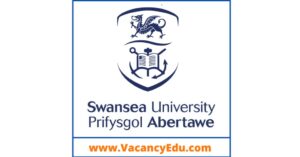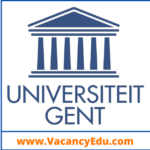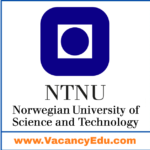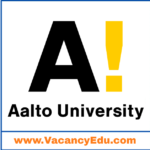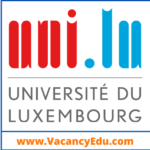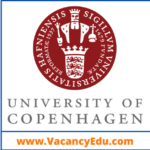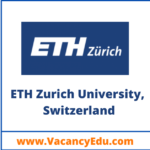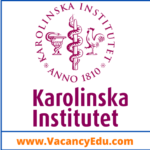Swansea University, Wales, United Kingdom invites online Application for number of Fully Funded PhD Degree at various Departments. We are providing a list of Fully Funded PhD Programs available at Swansea University, Wales, United Kingdom.
Eligible candidate may Apply as soon as possible.
(01) PhD Degree – Fully Funded
PhD position summary/title: Neuroscience and Genetics: Fully Funded MSc Studentship in Identification of a novel gene mutation for episodic ataxia (RS783)
Funds are available to pay the fees of a MSc by Research in Medical and Health Care Studies for a student working on a project that seeks to produce a zebrafish model of episodic ataxia. Ataxia is a neurological disorder affecting movement, balance, and speech. A gene mutation has been identified in a family with episodic ataxia, to confirm if this is the causative mutation, zebrafish with the same mutation will be created to test for similar symptoms.
Deadline : 7 April 2025
(02) PhD Degree – Fully Funded
PhD position summary/title: Wider Data Science Field: Fully Funded Health Data Research UK PhD: Understanding the relationship between indoor air quality in schools and asthma and educational outcomes (RS784)
The successful candidate will work in a highly interdisciplinary environment as part of a vibrant cohort of HDR UK-funded PhD students, with outstanding networking opportunities with fellow students and colleagues located across the 4 nations of the UK. HDR UK’s mission is to unite the UK’s health data to enable discoveries that improve people’s lives. Its 20-year vision is for large-scale data and advanced analytics to benefit every patient interaction, clinical trial, and biomedical discovery and to enhance public health.
Deadline : 7 April 2025
View All Fully Funded PhD Positions Click Here
(03) PhD Degree – Fully Funded
PhD position summary/title: Sport Psychology; Sport Management: Fully Funded PhD Studentship in Research Integration for Sport Experiences: Improving Knowledge Translation and Implementation in Youth Sport (RS768)
Sport science is an inherently applied field, and yet sport organisations often cite an inability to effectively interpret and apply research evidence to practice. Financial and staff knowledge limitations are among the most commonnly reported reasons for the underutilisation of research evidence in sport organisations – research is expensive to access and hard to interpret. Knowledge translation is a field of research aimed at reducing the research-to-practice gap.
Deadline : 24 February 2025
(04) PhD Degree – Fully Funded
PhD position summary/title: Sports and Exercise Science: Fully Funded EPSRC INEOS PhD: Towards the Development of Digital Twins for Efficient Talent Identification in Professional Cycling (RS766)
The landscape of professional cycling has changed dramatically over the past decade with more nations represented at a professional level. This has led to more professional teams introducing development teams (U23s), and increasingly more teams are now considering riders at the junior level to ensure a pipeline of talented riders.
The identification of talent at younger ages is becoming increasingly competitive; more efficient and effective methods are needed. Cycling remains one of the more technologically advanced sports and various forms of performance and race data are often publicly available. However, these data sources are vast and sometimes inconsistent – automated methods would enhance the collation and analysis of data to better identify talent that can consequently be invited for further testing.
The aim of this project is therefore to design and build a digital thread. This will utilise current and legacy INEOS performance metrics and associated public data streams to identify and track the trajectory of junior level riders across the world. Initially, techniques will be designed to follow national junior results across all competition formats in a select number of countries and build automated systems to flag ‘unusual and interesting’ results. This will then allow more in-depth exploration of individual training history and trajectories over time.
Deadline : 24th February 2025
(05) PhD Degree – Fully Funded
PhD position summary/title: Social Sciences: Fully Funded PhD Studentship in AI in Higher Education (RS780)
This PhD project plans to explore the influence of student access to generative artificial intelligence (generative AI) software on learning motivation and outcomes at higher education institutions. Against the backdrop that the use of generative AI will depend on many individual and contextual factors, the project employs a combination of carefully designed online and field experiments in real-world educational settings. These experiments aim to uncover how generative AI influences the effectiveness of different types of academic assignments, learning motivation, and what potential it offers to provide an inclusive learning environment, where learning disparities among students are reduced.
Deadline : 24 February 2025
Polite Follow-Up Email to Professor : When and How You should Write
Click here to know “How to write a Postdoc Job Application or Email”
(06) PhD Degree – Fully Funded
PhD position summary/title: Quantum String Theory: Fully Funded PhD Studentship in Black Hole Microstates, Integrable Systems, and Quantum String Theory (RS760)
Understanding black holes at the quantum level is one of the most profound challenges in theoretical physics. This project seeks to explore the microscopic origins of black hole entropy, the dynamics of black hole microstates, and their effective descriptions using cutting-edge techniques in string theory and integrable systems. Recent breakthroughs, including connections between integrable deformations and six-dimensional holomorphic Chern-Simons theory, offer a new lens to analyze the quantum structure of spacetime. The aim is to develop a quantum framework to describe black hole microstates, linking tools from integrability, holography, and quantum string theory.
Deadline : 24 February 2025
(07) PhD Degree – Fully Funded
PhD position summary/title: Psychology: Fully Funded SURES PhD Studentship in Cognitive Neuroscience (RS778)
This post is for an ambitious PhD student who is eager to further develop their research and neuroimaging experience under the supervision of Dr. Kathrin Weidacker at Swansea University, School of Psychology.
The position is particularly suitable for a Psychology or Neuroscience MSc graduate. We specifically seek highly motivated candidates with a strong academic (or work experience-based) background in psychology, neuroscience, cognitive science, or a related discipline, and a keen interest in cognitive neuroscience.
This PhD project offers the opportunity to work on pioneering research that uses state of the art neuroscience methods (e.g. MRS, fMRI, EEG) and behavioural research to enhance new assessments of impulsivity in healthy as well as clinical disorders.
Deadline : 24 February 2025
(08) PhD Degree – Fully Funded
PhD position summary/title: Physics: Fully funded PhD Scholarship in the Theoretical Explorations on the Lattice with Orthogonal and Symplectic group (TELOS): toward the Exascale Frontier (RS775)
High-Performance Computing is entering a revolutionary phase characterised by Exascale capabilities, with step-changes in technology enabling numerically intensive processes to answer outstanding foundational questions. To benefit from this revolution in full, it is of utmost importance to influence the related development with a highly ambitious scientific programme underpinned by robust Exascale-ready software.
The TELOS collaboration, co-led by researchers at Swansea University and The University of Edinburgh, and with links in other Institutions in the United Kingdom, Taiwan, Korea, Austria and Japan, plays a central role in the study of new gauge theories that have the potential to address many of the STFC challenges in Frontier Physics, such as the origin of dark matter in the universe, and the nature of electroweak symmetry breaking and mass generation in the standard model. We developed state-of-the-art (open source) software working on GPU- and CPU-based supercomputing architectures, and secured computing resources from the UK-based as well as iInternational supercomuting facilities. The research programme is now entering its mature development phase, high high-precision measurements of new observables have become possible, which require a step change in the performance of the parallel software used in lattice field theory calculations. The candidate will be allocated a research project sitting at the interface between lattice field theory and particle physics, tailored around their scientific skills and ambitions, and will be leading the development, testing, and benchmarking of new pre-exascale-ready software that the candidate will use to study new physics scenarios.
Deadline : 24 February 2025
Click here to know “How to Write an Effective Cover Letter”
(09) PhD Degree – Fully Funded
PhD position summary/title: Bioscience: Fully Funded SURES PhD in Multi-OMICs approach to characterise an in vitro lung model as a predictive tool for human health hazard and disease development RS779
The aim is to use multi-omic approaches to characterise the effects of air pollutants on an established in vitro model of the human lower lung, to reveal mechanistic insights associated with disease development.
Objectives:
- Create realistic pollutant exposure samples representing indoor and outdoor pollutants (mixtures) using an established model of the human alveolar epithelial barrier.
- Apply multi-omic approaches to assess differential gene expression and altered pathways associated with pollutant exposures, integrating this data to identify mechanisms associated with disease development.
Deadline : 24 February 2025
(10) PhD Degree – Fully Funded
PhD position summary/title: Physics & Mathematics: Fully Funded PhD studentship in Theoretical Explorations on the Lattice with Orthogonal and Symplectic group (TELOS): toward the Energy Frontier (RS776)
Theories with orthogonal and symplectic group offer a new theoretical environment to address open problems in fundamental physics. Applications encompass electroweak symmetry breaking, mass generation, dark matter, and the relic density of stochastic gravitational waves, STFC challenges in Frontier Physics.
The TELOS collaboration, co-led by researchers at Swansea University and The University of Edinburgh, and with links in other Institutions in the United Kingdom, Taiwan, Korea, Austria and Japan, plays a central role in the study of such theories.
We developed state of the art (open source) software working on GPU- and CPU-based supercomputing architectures, and secured computing resources from the UK-based as well as iInternational supercomuting facilities. The research programme is now entering its mature development phase, high precision measurements of new observables have become possible. The candidate will be allocated a research project in lattice field theory, taylored around their scientific skills and ambitions, addressing one or more of the aforementioned challenges in frontier physics.
Deadline : 24 February 2025
Connect with Us for Latest Job updates
(11) PhD Degree – Fully Funded
PhD position summary/title: Physics: Fully funded EPSRC DTP STFC PhD in the Complexity in Conformal and Confining field theories and Holography (RS753)
The idea of Complexity, borrowed from Mathematics and Computer science, has recently emerged as generic Quantum Field Theories. While complexity is well-defined for simple systems like quantum circuits, calculating it for a Quantum Field Theory, which exhibits Conformal or Confining dynamics, is less straightforward.
This project aims to properly define and compute complexity for general Quantum Field Theories. The key technical tool is Holography, namely AdS/CFT and Gauge-Strings dualities. The project has many possible derivations in other areas.
The project builds on recent developments by the supervisors, contributing to the wider Physics community.
Deadline : 24 February 2025
Polite Follow-Up Email to Professor : When and How You should Write
(12) PhD Degree – Fully Funded
PhD position summary/title: Physics : Fully funded PhD STFC and Swansea University in the Centre vortices as confinement mechanisms in QCD (RS754)
There is a great deal of interest in the nature of QCD, the strong interaction force of particle physics. It has a fascinating personality – in all but the most exotic situations, it confines quarks together into hadrons such as protons and neutrons with a force of 15 tonnes (the weight of 3 elephants), but at large temperatures >1012C such as occurred just after the Big Bang, it is feeble and hadrons fall apart.
How confinement works in QCD, and how temperature affects it is not understood mathematically. Unsurprisingly, it is the subject of intense research and a $1M Millennium Prize. There are however a number of interesting, insightful ideas which may point to a more profound understanding. One of these is “Centre Vortices”. These are the non-perturbative part of the gluonic fields and distil important topological structures thought to contain the essence of confinement.
This project will use a first-principles approach in which large-scale simulations of QCD are performed on a discretised “lattice” version of space and time, similar to the finite difference approach in computational fluid dynamics. Using this Lattice QCD method, Centre Vortex fields will be analysed to understand particles called glueballs and the temperature effects of confinement.
Deadline : 24 February 2025
(13) PhD Degree – Fully Funded
PhD position summary/title: Physics: Fully Funded EPSRC & SFTC PhD Scholarship: Quantum spacetime geometry beyond the horizon (RS755)
Quantum mechanics and Einstein’s general relativity (GR) are the two major mathematical pillars on which our understanding of the physical world rests. We know the world is quantum, and GR tells us that gravity is curvature of spacetime geometry whose quantum description is largely unknown. This project will leverage recent insights on: (i) black holes and the quantum information puzzle; and (ii) holographic emergence of classical spacetime and gravity in D dimensions from quantum information measures applied to a dual quantum mechanical model in D-1 dimensions; to reveal quantum signatures of spacetime geometry behind the horizon of a black hole, and further aim to explore the physics of spacetime singularities.
Deadline : 24 February 2025
(14) PhD Degree – Fully Funded
PhD position summary/title: Physics: Fully Funded STFC and Swansea University PhD Scholarship: Chern Simons Theory and Integrability (RS756)
This exciting project in mathematical and theoretical physics will investigate novel approaches to quantum systems with integrability. Normally the equations that determine physical systems, be it quantum field theory describing particle physics or string theory describing quantum gravity, are too hard to solve exactly. However, there are very special systems that have deep hidden symmetries that allow one to exactly solve these equations instead of using e.g. perturbation theory. The study of these integrable systems is a critical area in the intersection of mathematical and theoretical physics and string theory.
The group at Swansea led by Hollowood and Thompson have been pivotal in the recent discoveries of a landscape of integrable models known as Integrable Deformations. Very recently a new outlook on this topic has been provided by the six-dimensional holomorphic Chern Simons theory which has been conjectured to provide an origin for all such integrable deformations. The goal of this project is develop a detailed quantum understanding of this approach and to apply it in a range of contexts in including to resugrence, holography and string theory.
Deadline : 24 February 2025
(15) PhD Degree – Fully Funded
PhD position summary/title: Molecular and Cellular Cardiology: Fully Funded SUSPRS HMRI PhD Studentship: Cellular Memory-based Organisation and Self-Assembly In Cardiorepair (RS777)
We are looking for a talented and motivated student to join an exciting new project that takes a unique approach to tackling heart failure (HF). HF is a complex syndrome that results in the inadequate pumping of blood around the body and it compromises the length and quality of life of more than 65 million people worldwide. It has a five-year mortality rate of 50% and places a huge burden on healthcare systems (globally estimated at £280 billion rising to more than £600 billion by 2030 due to the ageing population). There is an urgent need for innovative solutions to address the current challenges in HF management. You will join a team exploring the novel concept that the human heart possesses an intrinsic memory of its cellular organisation which is a critical determinant in any functional recovery from HF.
Deadline : 24 February 2025
(16) PhD Degree – Fully Funded
PhD position summary/title: Mechanical/Materials Engineering: Fully Funded EPSRC and Schmidt-Clemens Spain PhD Scholarship: Modelling of Complex Load Cycles at Elevated Temperature (RS727)
Engineering components such as those found in high temperature plant applications are often subjected to cycles during which both stress and temperature change. These cycles can occur during normal service or during start-up/shut-down cycles and can significantly limit service lives of the components. Due to thermal gradients associated with heating and cooling, these load/thermal cycles are complex in nature and the cycle frequency is typically lower than that of a normal thermo-mechanical fatigue (TMF) cycle resulting in deformation dominated by creep mechanisms. The aim of this project is to develop a model for the deformation and damage that occurs during these complex cycles. A constitutive model which accounts for the effects of stress and temperature changes on material hardening and damage will be implemented within finite element (FE) software allowing predictions of component behaviour to be made.
Deadline : 24 February 2025
(17) PhD Degree – Fully Funded
PhD position summary/title: DBA (Value-Based): Fully funded Welsh Government Doctor of Business Administration, DBA (Value-Based Health and Care Academy Scholarship) (RS782)
As a result of a change in funding allocation, we are able to offer a limited number of full-fee scholarships available specifically for those researching projects in the field of Value-Based Health and Care.
The Swansea School of Management DBA is a part-time professional doctorate designed for senior managers and leaders in all sectors; private, public and not-for-profit.
In this programme, learners engage in applied research, bringing established and cutting-edge theories to bear on their practical organisational issues. You will develop and enrich practice in your field, as well as contribute to our understanding of the underpinning theoretical base for the work.
The structured approach offered by the Swansea DBA is based on six modules over three years, blending lectures, guest talks, workshop discussions and student presentations. The doctoral thesis is developed in parallel under guidance from a doctoral supervisory team allocated at the start of the programme.
The Swansea School of Management DBA is designed to develop critical thinkers and practitioners who will reflect on their impact on their organisations and society more generally.
Deadline : 24 February 2025
(18) PhD Degree – Fully Funded
PhD position summary/title: Mechanical Engineering: Fully funded EPSRC PhD Scholarship in the Circular approach to On-body Renewable Energy generators (CORE) (RS769)
New generations of wearable devices are enabling personalised healthcare and the early identification and prevention of diseases, all without leaving the home. These comfortable and convenient devices can chart a person’s wellness or progress electronically, with multiple new opportunities being explored. To meet these demands, innovative renewable energy solutions can provide reliable and continuous power to these devices, without the inconvenience of frequent recharging. Current energy sources, like rechargeable batteries, fall short due to their discomfort and impracticality for cutting-edge wearables such as smart clothing, e-textiles, and electronic skin patches.
Your role will be to develop lightweight and conformable wearable energy solutions, that are safe to wear in contact with skin. These will enable energy generated from the body to be harnessed, employing technologies such as biofuel cells, thermoelectric, piezoelectric, and electromagnetic generators. Scalable, additive manufacturing methods will be employed to develop potential designs, substrates and functional materials. This will employ device manufacture, device characterisation and material characterisation techniques available at Swansea University Bay Campus to prototype these devices and assess their potential. This project will also develop circular economy approaches for the retention of critical raw materials (CRMs) in lifecycles of additively manufactured electronics for wearable energy generation applications. This will involve the utilisation of reclaimed materials in manufacturing, minimizing the environmental impact of the manufacturing processes, and optimising end-of-life strategies, to create more sustainable energy-generating devices.
Deadline : 24 February 2025
(19) PhD Degree – Fully Funded
PhD position summary/title: Mathematics: Fully Funded PhD Scholarship in Toric Geometry and Multivariate Splines (RS759)
The aim of this PhD project is to explore the properties of splines through the lens of applied algebraic geometry, with a particular focus on their relationship to toric geometry. Splines are mathematical representations built upon simpler pieces (usually defined by low-degree polynomials) glued together to form smooth curves, surfaces, or higher-dimensional objects. They are fundamental tools for approximation and computational design, crucial in finite element methods, computer vision, and geometric deep learning.
Splines can be viewed as functions defined over polyhedral complexes. These complexes, in turn, define toric varieties in algebraic geometry, and it has been proved that the set of splines on a polyhedral complex can be seen as the equivariant cohomology ring of the associated toric variety. This project will focus on the equivariant cohomology subrings and representations corresponding to splines with continuous derivatives of order at least 1, with the aim of making significant progress toward a deeper understanding of these structures.
The ideal candidate for this project should have a background in algebra, combinatorics, and/or geometry, and will have the opportunity to complement their knowledge in the remaining areas throughout the project, as well as develop an understanding of the various applications of spline methods. The project can be tailored to the applicant’s interest in either the theoretical or computational aspects of the topic. Coding skills are desirable but not essential.
Deadline : 24 February 2025
How to increase Brain Power – Secrets of Brain Unlocked
(20) PhD Degree – Fully Funded
PhD position summary/title: Mathematics: Fully Funded PhD Studentship in Investigating the Impact of Nonlocal Interactions (RS761)
Flocks of birds, schools of fish, swarms of insects and coordinated cell migration are among the most fascinating examples of collective behaviour observed in nature. These behaviours are underpinned by mathematical principles – many of which remain mysterious. They often arise from long-range interactions between individuals that can be effectively described by nonlocal mathematical models. This class of models has proven successful in capturing interactions in a wide range of biological systems, from cell-cell communication to animal group behaviour. However, our analytical understanding of these models remains limited.
This fully funded PhD Scholarship will focus on bifurcation structures in nonlocal advection-diffusion models, with the aim of advancing our understanding of these systems. The project will use a combination of analytical techniques and numerical methods to explore how such models can provide new insights into collective phenomena. The research is expected to have broad implications, offering advances in mathematical theory as well as applications in fields such as spatial ecology, developmental biology and cancer research.
Deadline : 24 February 2025
(21) PhD Degree – Fully Funded
PhD position summary/title: Materials Engineering : Fully Funded SU/ Rolls-Royce PhD Studentship: Mechanism (RS767)
MECHANISM will advance our fundamental knowledge of the in-service operation, processing characteristics and mechanical/physical behavioural response of advanced structural materials within extreme environments as well as continuing to develop step-change advances in viable alloy and composite compositions. The resulting techniques and understanding will enable the sustainable life-cycle of advanced materials, supporting design (digitally enabled), repair (aftermarket) and advanced manufacturing technologies, whilst supporting more efficient and environmentally friendly power systems into the future, reducing the impact of carbon technologies where possible.This fundamental life-cycle understanding is a key enabler to maintain competitiveness for UK power systems in the highly competitive international market, recognising the growing interest in new transportation technologies such as electrification, hybrid power systems, marine, and land-based freight. These goals will be delivered through a research-driven understanding of the fundamental mechanical properties of these advanced structural materials which will operate in highly demanding stress and environments throughout their life cycle.
Deadline : 24 February 2025
(22) PhD Degree – Fully Funded
PhD position summary/title: Materials Engineering: Fully Funded PhD Studentship in Advancing Sustainable Solar Solutions to Transform Global Energy Access (RS757)
This PhD project will accelerate the development of printable perovskite photovoltaics (PV) for deployment in Africa by focusing on the sustainable materials that form the foundation of these technologies. Guided by advanced photochemical characterisation techniques, you will use tools to deepen understanding of the uniformity, morphology, performance, and stability of perovskite devices. You will work to develop and optimise materials that are cost-effective, efficient, and adaptable to diverse environmental conditions. The project will also involve assessing material performance and environmental impacts, through tools like lifecycle analysis, contributing to lifecycle sustainability and the development of processes for reusing and recycling key materials into second-generation products. By engaging with UNESCO Chair partners and communities, your work will ensure that these renewable energy technologies are both technically advanced and socially impactful, with real-world testing and applications in underserved regions.
Deadline : 24 February 2025
(23) PhD Degree – Fully Funded
PhD position summary/title: Law: Fully Funded PhD Studentship in Democratic Participation and Prisoners (RS780)
Imprisonment, the UK’s main form of criminal punishment, has wide-ranging collateral consequences beyond deprivation of liberty. These ‘hidden’ punishments are often unintended but have significant effects on convicted people and their ability to participate in society, including profound impacts upon democratic engagement and participation.
In the UK most prisoners are formally disenfranchised during their term of imprisonment, so prisoners’ ability to participate in democratic processes is obviously curtailed. The lawfulness of prisoner voting bans in the UK and Europe has been a prominent topic of debate both in legal scholarship and mainstream politics. This project will not focus narrowly on these doctrinal debates. Instead, it will be broader both in its approach to democracy and in its view of the ways imprisonment conceivably might impact upon democratic engagement and participation, including significant focus on the collateral democratic consequences of imprisonment.
Deadline : 24 February 2025
(24) PhD Degree – Fully Funded
PhD position summary/title: Electronic science and technology: Fully Funded PhD Studentship in High sensitivity spintronic sensors (RS781)
With the ongoing advancements in artificial intelligence and smart systems, the demand for high-sensitivity sensors is increasing. Traditional sensing mechanisms can no longer meet the requirements of emerging applications. Beyond conventional physical and chemical sensors, spintronic sensors make use of changes in electron spins under external stimuli to make accurate measurements, offering sensitivity that surpasses traditional sensors by several orders of magnitude. Many spintronic sensors are based on defects within micro- and nanostructured or two-dimensional van der Waals (vdW) materials. These sensors have found extensive applications in fields such as quantum computing, information technology, biosensing, microwave and magnetic field detection, and more.
Deadline : 24 February 2025
(25) PhD Degree – Fully Funded
PhD position summary/title: Culture and Communication: Fully Funded PhD Studentship in Advancing Innovative Thinking and Research (RS780)
This project is situated within the dynamic and interdisciplinary environment of the School of Culture and Communication, spanning fields such as American Studies, Classics, Ancient History and Egyptology, English Literature, Media Studies, and Translation. It aims to explore a contemporary and impactful research topic that addresses critical societal, cultural, or historical issues while contributing to academic discourse and real-world understanding.
We also welcome applications in related research areas connected to our four Faculty interdisciplinary Research Institutes in Culture and Communities, Geopolitical Challenges, Innovation and Entrepreneurship, and Public Policy and Practice, as well as the two Faculty Research Networks: Climate Action Research Network (CARN) and Network for Artificial Intelligence, the Arts, the Digital Economy & Society (NAIADES).
Deadline : 24 February 2025
(26) PhD Degree – Fully Funded
PhD position summary/title: Computer Science: Fully Funded PhD studentship in Zero-knowledge Succinct Non-interactive Argument of Knowledge for Public Good (RS758)
Recently, many councils in Wales started using single transferable vote (STV) method for counting ballots. While counting plaintext ballots using STV method is straight forward, but a rank-based ballot may leak the voter’s preferences if published publicly in plaintext, as the ranking order can reveal detailed information about the voter’s identity. Therefore encryption is necessary to hide the ranking. However, STV method becomes considerably more complex with encrypted ballots. Our goal is to develop an algorithm/protocol to count encrypted ballot using the STV method. Our first point of investigation will be zero-knowledge succint non-interactive argument of knowledge– ZkSNARK. Subsequently, we will formalise the front-end (R1CS) and back-end (Groth16) of ZkSNARK in the Coq theorem prover and use this formalisation to encode our STV algorithm on encrypted ballots. This approach aims to ensure both the correctness and privacy of the tallying process, paving the way for verifiable and secure election systems that is resistent to coercion.
Deadline : 24 February 2025
(27) PhD Degree – Fully Funded
PhD position summary/title: Computer Science: Fully Funded EPSRC DTP PhD Scholarship: Vertical Multi-Purpose Farming Robotic System (RS676)
At its heart, the project is about developing Vertical Multi-Purpose Farming Systems. From providing cost-effective, year-round agriculture to creating disease-resistant crops and yield prediction using computer vision, the technologies you develop have the potential to shape the future of farming. It may become the path to devising new vertical agricultural techniques, paving the way for sustainable methodologies in the agriculture sector. Join us and participate in this exciting project. At Swansea University you will do more than just research; you will be positively impacting people’s lives and the environment.
Deadline : 24 February 2025
(28) PhD Degree – Fully Funded
PhD position summary/title: Civil Engineering: Fully funded STFC and Swansea University PhD in the Multi-physics modelling of laser shock peening: bridging microscopic to macroscopic scales (RS763)
In the process of laser shock peening (LSP), metallic structural components are hit by a controlled laser. The sudden vaporisation of material at the structural surface creates large magnitude pressure shock waves which induce compressive residual stresses in the structure, thereby improving the surface hardness and the resistance to fatigue cracking and to corrosion. LSP is more effective than traditional shot peening and is important for applications in the construction, aerospace and automotive industries. Other applications include the forming of thin components or the breaking up of hard materials. The computer modelling of LSP remains challenging due to its multi-physics and multi-scale nature. The dependency of the process on the shape of the laser pulse, its energy, ablation layers etc. is not sufficiently understood. This involves complex physics at the interface of plasma physics, shock physics, material science and thermodynamics.
The objective of this project is the computational modelling of laser shock peening. Molecular Dynamics (MD) and Finite Element (FE) simulations will be combined to account for the complex physical phenomena and their different scales. The interdependence of physical conditions (pressure, pulse time, temperature) will be investigated, allowing for the design of efficient shockwaves. Essential multi-physics software tools will be developed. The project is a collaboration between Swansea University and the STFC (Scientific Computing Department + Central Laser Facility).
Deadline : 24 February 2025
(29) PhD Degree – Fully Funded
PhD position summary/title: Chemistry: Fully Funded EPSRC DTP PhD Studentship: The effect of rotational polarisation on gas-surface reactivity (RS726)
Hydrogen is the most abundant molecule in the universe, and its interaction with surfaces plays a key role in a huge range of processes, from star formation to the safe storage of rocket fuel, to industrial catalysis and green energy production. The aim of this PhD project is to study hydrogen colliding with surfaces at a fundamental molecular level to gain unprecedented insight into the role that rotations play in gas-surface collisions.
The Surface Dynamics team, which includes researchers with both physics and chemistry backgrounds, has developed a Magnetic Molecular Interferometer (MMI) apparatus which can be used to control and manipulate the rotational orientation projection states of hydrogen molecules, which can classically be considered to correspond to whether the molecules are preferentially rotating like a helicopter or a cartwheel before they collide with the surface. The PhD project, which forms part of a Future Leaders Fellowship project (MR/X03609X/1), will explore whether changing the rotational orientation projection state of the H2 molecule affects the probability that energy is transferred between the molecule and the surface as well as the reactivity of the H2 with the surface.
This project will involve using and further developing both the experimental and data analysis methods that are currently used within the research team. The student will learn how to use the MMI apparatus, gaining knowledge of, for example, molecular and atomic beams, ultra-high vacuum systems, cryogenic technologies and a range of measurement and surface science techniques. They will also analyse the experimental data, developing techniques to extract information about the rotational orientation dependence of the gas-surface reaction, as well as performing numerical simulations to determine how best to perform the measurements to maximise the information that can be obtained.
Deadline : 24 February 2025
(30) PhD Degree – Fully Funded
PhD position summary/title: Business Management: Fully Funded PhD Studentship in Sustainable Pedagogy in Business and Management Schools (RS780)
Climate change is the biggest threat facing humanity, yet scientific consensus suggests we are far from an appropriate response. Reasons for this are complex and many, but one piece of the puzzle is the way our economy and the organisations within it are currently framed; and one element of that is the way these things are taught in Business and Management schools (BMSs). Growing recognition of this has produced a number of responses; for example, Cardiff Business School recently declared itself the world’s first public value business school, and myriad projects are emerging to encourage a shift away from business-(pedagogy)-as-usual (McPhail et al., 2024). Learning from these innovations, collating examples of best-practice, sharing resources and networking are vital features of this movement for change, yet little of this is currently happening. With this project we want to understand the reasons why business education is lagging behind other areas in driving sustainability forward. We see an opportunity for Swansea to be at the forefront of such work, and the allocation of a Scholarship specifically aimed at researching this topic would produce not only valuable work but also place Swansea at the heart of the conversation.
Deadline : 24 February 2025
(31) PhD Degree – Fully Funded
PhD position summary/title: Biological Sciences: Fully Funded PhD Studentship in Comparative Analysis and Modelling of Collective Behaviour in Natural and Artificial Systems (RS762)
Animal groups exhibit remarkable coordination and problem-solving capabilities, such as schools of fish working together to deter attacks by predators or fire ants creating rafts using their bodies to float over floodwaters. Recent work in behavioural biology emphasises how differences among individuals within groups (e.g., biomechanics, physiology, behaviour, cognition) determine group structure and functioning [1]. Building on these insights, you will compile and standardise datasets of collective movement and collect new data from multiple species of freshwater fish. From these data, you will identify and compare discrete “events” of coordinated movement and use our recently developed “swaRmverse” analysis pipeline [2] to perform inter- and intra-species comparisons of collective movement [3]. Based on these comparisons, you will create agent-based models (ABMs) that define interaction rules based on observed similarities and differences in events [4], with a focus on the specific role of individual differences. Creation of these ABMs will advance our understanding of why evolution selects and maintains individual heterogeneity [1]. You will apply this knowledge to engineered swarm systems. Swarm systems tend to rely on simple and homogeneous interactions used in early ABMs of collective motion [5]. Using the newly developed ABMs, you will create a model catalogue targeted at specific engineering problem domains that researchers in swarm robotics can use for developing more adaptive and efficient swarm systems [6].
Deadline : 24 February 2025
(32) PhD Degree – Fully Funded
PhD position summary/title: Aerospace Engineering: Fully Funded PhD EPSRC Studentship in advanced numerical methods for curing process simulation of fibre-reinforced composites (RS774)
This PhD project focuses on computational mechanics. It seeks to advance the development of numerical methods for curing process simulation of fibre-reinforced composite materials, especially the carbon fibre-reinforced polymer (CFRP). CFRP composites have gained prominence in industries such as aerospace and automotive due to their exceptional strength-to-weight ratio and highly flexible designability. Curing process is the crucial stage in manufacturing the CFRP composites with thermoset matrix. It is known that the manufactured components often contains non-negligible deviations from the nominal geometry, due to the residual stresses accumulated from the curing process. Therefore, optimising the design and analysis of CFRP structures requires a deep understanding of the complex curing process behaviour and intricate computational models.
Currently, the complete simulation workflow for curing process modelling of CFRP composites is time consuming as it relies heavily on manual iterations. This project aims to develop reliable computational tools to minimise the gap between designed geometry and manufactured geometry for the composites, incorporating state-of-the-art computational techniques, such as high-order finite element methods, reduced order modelling and machine learning. The development of the tools will require significant amount of computer programming using Python, C/C++ and Fortran. The candidate will also have the opportunity to produce CFRP specimens for experimental tests.
Deadline : 24 February 2025
(33) PhD Degree – Fully Funded
PhD position summary/title: Engineering & Physics: Fully Funded PhD Studentship in Design, Manufacturing and testing of “living” cellular microfluidic sensors (RS773)
Cells are living systems highly sensitive to changes to the local environment, meaning that a change of temperature, pH or other properties can result in the cell changing its morphology and overall behaviour. In this project, the successful candidate will employ such cell behaviour to design, fabricate and test microfluidic fibres containing cells; such structures will act as “living sensor”, providing a physical response to a variety of external stimuli such as drug administration, electric signal, mechanical stimuli, and temperature gradients. The impact of this project stems in anticipated applications in diagnostic healthcare and drug development.
The candidate will design fibres having controlled cells spacing, by using the principle of viscoelasticity-induced ordering in straight microchannels (https://pubs.acs.org/doi/full/10.1021/acsaenm.2c00060). The advantage over traditional methodologies is that cells will be aligned along a single line in the fibre, meaning that the external stimuli will be uniformly felt along the cell population line, resulting in the first-of-its-kind living tuneable sensor with cell-specific response. Unit sensors will be robustly characterised. Data will train a machine learning model to optimise sensor configurations (for multiple unit sensors) for a given application. The project will bring together Soft Matter, Biomedical Engineering and Data Science to generate a versatile tool with great potential across several fields. Experimental activities will mainly be carried out at the Rheological Microfluidic lab led by Dr. Francesco Del Giudice.
Deadline : 24 February 2025
About Swansea University, Wales, United Kingdom –Official Website
Swansea University (Welsh: Prifysgol Abertawe) is a public research university located in Swansea, Wales, United Kingdom. It was chartered as University College of Swansea in 1920, as the fourth college of the University of Wales. In 1996, it changed its name to the University of Wales Swansea following structural changes within the University of Wales. The title of Swansea University was formally adopted on 1 September 2007 when the University of Wales became a non-membership confederal institution and the former members became universities in their own right.
Swansea University has three faculties across its two campuses which are located on the coastline of Swansea Bay. The Singleton Park Campus is set in the grounds of Singleton Park to the west of Swansea city centre. The £450 million Bay Campus, which opened in September 2015, is located next to Jersey Marine Beach to the east of Swansea in the Neath Port Talbot area. The annual income of the institution for 2021–22 was £369.9 million of which £69.2 million was from research grants and contracts, with an expenditure of £446.3 million.
It is the third largest university in Wales in terms of number of students. It offers about 450 undergraduate courses, 280 postgraduate taught and 150 postgraduate research courses to 20,375 undergraduate and postgraduate students.
Disclaimer: We try to ensure that the information we post on VacancyEdu.com is accurate. However, despite our best efforts, some of the content may contain errors. You can trust us, but please conduct your own checks too.
Related Posts
- PhD Degree (20)-Fully Funded at Ghent University, Belgium

- PhD Degree (22) -Fully Funded at NTNU, Norway

- PhD Degree (05) -Fully Funded at Aalto University, Finland

- PhD Degree (20) -Fully Funded at Luxembourg, Luxembourg

- PhD Degree (23) -Fully Funded at University of Copenhagen, Denmark

- PhD Degree (31) -Fully Funded at University of Southampton, England

- PhD Degree (24 )-Fully Funded at ETH Zurich, Switzerland

- PhD Degree (13)-Fully Funded at Karolinska Institute, Sweden

- PhD Degree (11) -Fully Funded at Cranfield University, England


